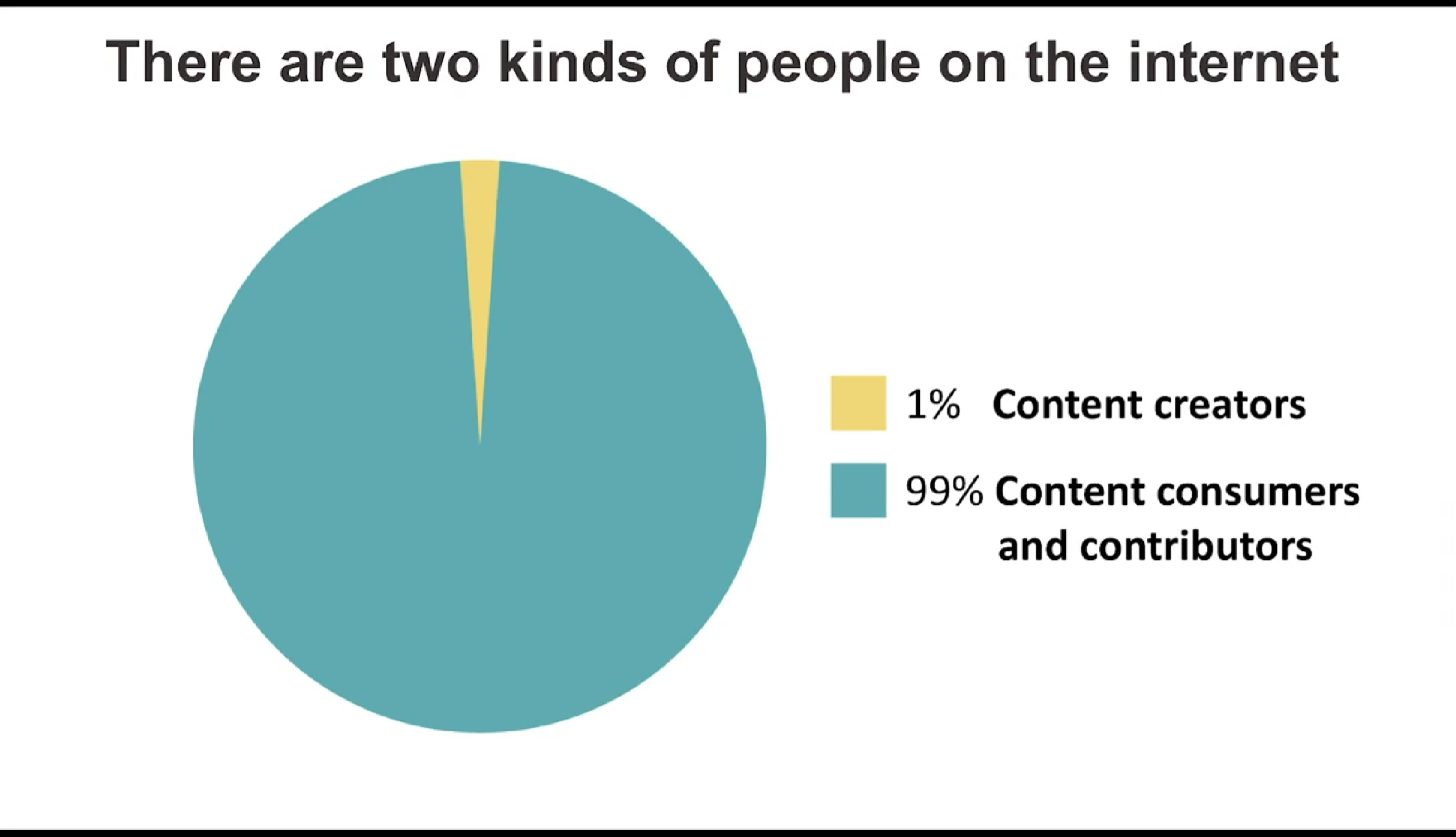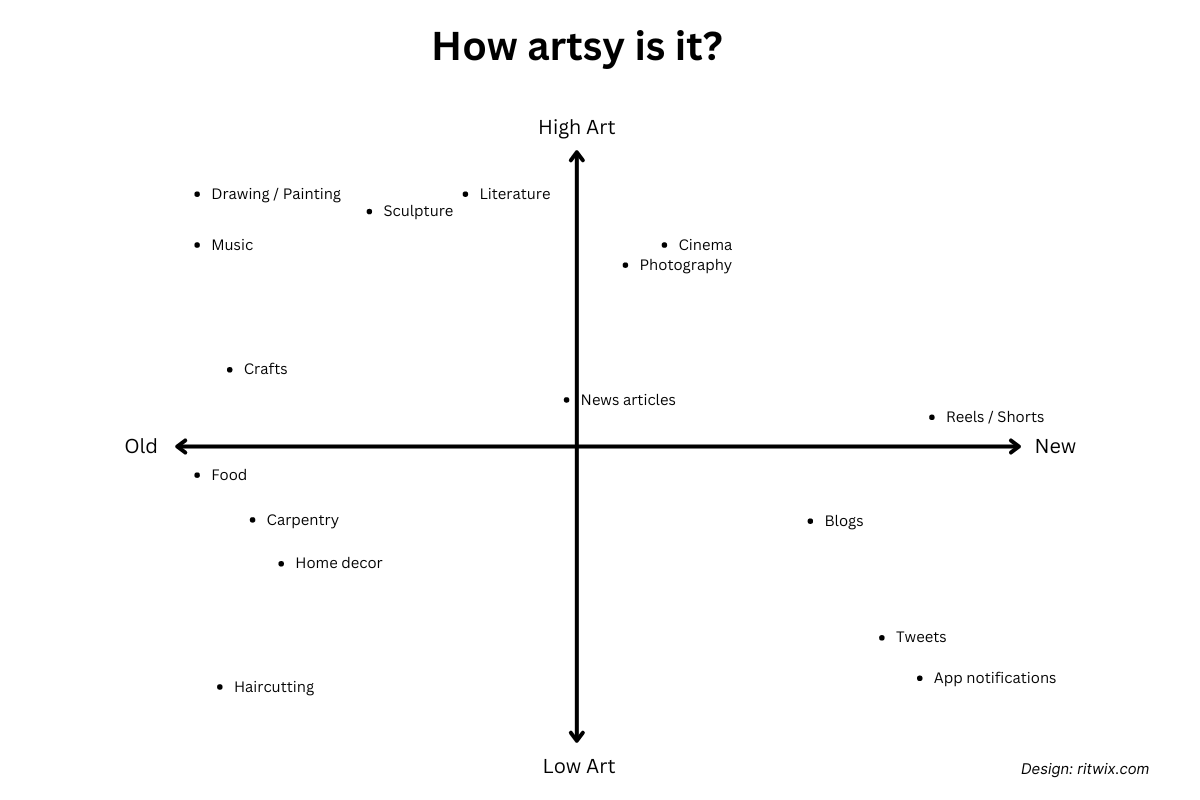As a digital content creator, I fall under the gigantic (yet paradoxically microscopic, as we shall soon see) umbrella of people who produce things that other people read, watch and listen to. Collectively, my cohort produces dreary technical brochures, spicy OnlyFans videos, and a whole lot in between. Today’s blog is centred around creation and consumption, and bigger questions like, “Umm, is this art?”
Who creates content?
Considering all the hours we spend each day devouring content, this is an often overlooked question. Somebody needs to make this stuff so our insatiable appetites for content can be kept in check. That’s where we run into the big issue at the heart of content: the problem of imbalance. According to Hubspot, only about 1% of people create content that the rest of us consume.

A bit too simplistic? I thought so too, so I looked into another dataset. The writers’ platform Medium has over 100 million registered users, while its Partner programme has 700,000 subscribers, according to this 2023 Tech Report guide. The Partner programme gives access to paywalled content, helping writers on the platform earn money. Now, even if all those subscribers were writers themselves, which they most certainly are not, that’s still just 0.7% who are creators. So, the imbalance is huge.
However, I am still not fully on board, and that’s because this question really begs another, which is…
What is considered content?
I’ll be upfront: I don’t have an answer to this one, but let’s work through it together.
The first bucket comprises some evergreen forms of content – literature and writing, drama and films, crafts and music. Then there are the other forms of creation – like cooking or home decoration – which are also ancient but don’t get the same level of appreciation as those of the previous set (in his excellent book Bullshit Jobs, David Graber thinks this has to do with gender norms). Some advertising folks would also consider their work as art but no one (else) cares. And finally, there are the newer forms of content – tweets, reels, video games – that are also perhaps not considered art. If we plot all this on a graph, it would look something like this.

In some cases, whether something is good art or not is simply a matter of branding. Haircutting is not considered art, coiffure is. A cobbler who makes a pair of shoes in a developing country, not an artist; a cobbler who makes a pair of shoes in a developed country, definitely high brow.
You might be wondering,
“Was my Insta story art?”
“What about that cringey post an old colleague put up on LinkedIn?”
“Do ChatGPT responses qualify?”
There was a time when the answer to any of these would have been a loud scoff, a definitive “No!” or a “Chat what?”, but not anymore. The lines have blurred. Sure, there are still people who would look down upon the idea of an app notification as art, for instance, or those that don’t consider being an influencer or YouTuber as a real job, but really, fuck those bourgeois purists!
One of my favourite things to read is the update notes of the Transit app on the Play Store. Most people barely even know when their apps are due for updates, forget reading the notes, and yet here’s this person choosing to make this little ignored touchpoint awesome. I see you, and love what you do!
Shoutout to the @transitapp writer for being consistently entertaining, especially considering the near invisibility of the medium (the app updates window). How does that saying go: If a traffic cone falls in the city, and no one’s there to see it… pic.twitter.com/bL37rePyRC
— Ritwik (@RitwikVarma) August 15, 2024
Social media’s arrival changed everything in content. Since the first publishing platforms burst into the scene around the turn of the millennium, the creation playing field has been continuously getting levelled. The tools to express oneself, and publish are now in billions of hands meaning anyone can become a creator, an artist, a documentarian. This has opened the floodgates; no more of the gatekeeping that protected the artists of the past.
Of course, not all content is made for entertainment or marketing; it’s also for documentation, and spreading information (or its evil cousins, misinformation and propaganda). For instance, if a genocide were taking place or people were living in a totalitarian or apartheid state (a completely hypothetical scenario), there would be content recording the extent of human right abuses on one side, as well as content justifying such atrocities on the other. If a certain corporation were poisoning the rivers in an area, there would be locals recording and sharing the misery they are going through.
That explains why I don’t have a conclusive answer to the question of what exactly constitutes art. That also opens possibilities.
Can I make art?
OR
Is what I make art?
YES! In fact, most of us are already doing some amount of creation. Writing restaurant reviews, shooting portraits of friends, outraging at government policies, all of which are forms of creativity.
The challenge, at least for me, is to do it consistently enough, and not sink into a state of total consumption (is rotting the term?). Practice over pleasure. While I talk about using intermittent fasting techniques to limit screen use, I will admit that when I lean into something I like (writing, learning a language or playing an instrument) but don’t see big results soon enough, it puts me off regular practice, and I default to scrolling the apps.
And because this is my own site, I can indulge in a bit of shameless plugging. My content falls into two main categories: writing and photography. On Instagram, my stories are full of the streets that I walk through daily, and other aspects of everyday life. Occasionally, I also post a mix of pictures and poetry-like writing on my undefined feed. On the other hand, my longer form writing happens more erratically, which is evident both from the chaotic writing in this piece, and the frequency of posting here.
If you are a newbie creator, I’d also like to leave you with something before you go. Ira Glass talks about a phase budding artists face called ‘The Gap’, and how we quit before we put in the 10,000-odd hours you need to become good at something.
Unsolicited Rick Picks is your source of irregular content. Don’t bother checking back every week; realistically speaking, try once in three-ish months.